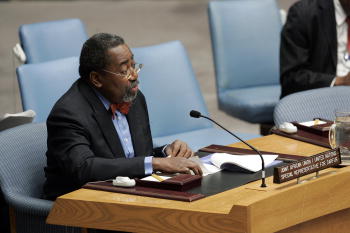UNAMID says ‘low intensity’ characterization of Darfur has been misunderstood
May 4, 2009 (PARIS) — The spokesperson of the UN-African Union Mission in Darfur (UNAMID) said today that the report presented last week by its civilian leader to the UN Security Council describing the situation in Darfur as a “low-intensity conflict” has been misunderstood.

Adada’s presentation of this data and his “low-intensity” label for the conflict drew fire from some UN Security Council members, notably the United States, whose ambassador suggested that Adada was contradicting reports by his own boss, Secretary-General Ban Ki-Moon.
Today Noureddine Mezni, the Mission’s spokesperson, clarified that Adada “was only speaking of what has transpired in the one year and a half of UNAMID’s existence in Darfur, based on factual enumerators done by senior military and security officers from different sectors.”
“His description of the Darfur conflict as a ‘low intensity conflict’ has been misunderstood,” Mezni told Sudan Tribune.
“Whether it is a ‘low intensity conflict’ or not, it is still a conflict which can easily deteriorate into a ‘high intensity conflict’ one,” he highlighted.
As Mezni described it, the UNAMID Joint Special Representative was just pointing to facts on the ground, basically to plead that the situation should not further deteriorate and that the peace process should be re-energized.
“The entire content of his report pointed out in great details the challenges that UNAMID continue to face and the dire situation that are affecting the population,” he added referring to the security environment faced by the peacekeepers.
In order to cope with the volatile security situation, UNAMID recently turned to the United States embassy in an appeal for oft-requested helicopters, but the mission’s commander left empty-handed. The UNAMID headquarters also in April suffered a major fire.
Mezni described the situation in Darfur in light of the heavy violence and displacement from 2003 to 2004, but reminded that some things have changed: “As JSR rightly pointed out the conflict of 2009 is not the same as 2004. However, he also clearly said that consequences of 2003 – 2004 was still upon us, this means that IDPs are not back to their homes and villages, and normal life has not resumed in different parts of Darfur.”
Adada’s remarks had inflamed rebels in the command of Sudan Liberation Army founder Abdel-Wahid Al-Nur, who declared that UNAMID personnel would not be allowed to enter “liberated areas” until Adada made a retraction and apology.
IDPs also protested news of the Security Council presentation, criticizing the report for belittling their plight.
(ST)
